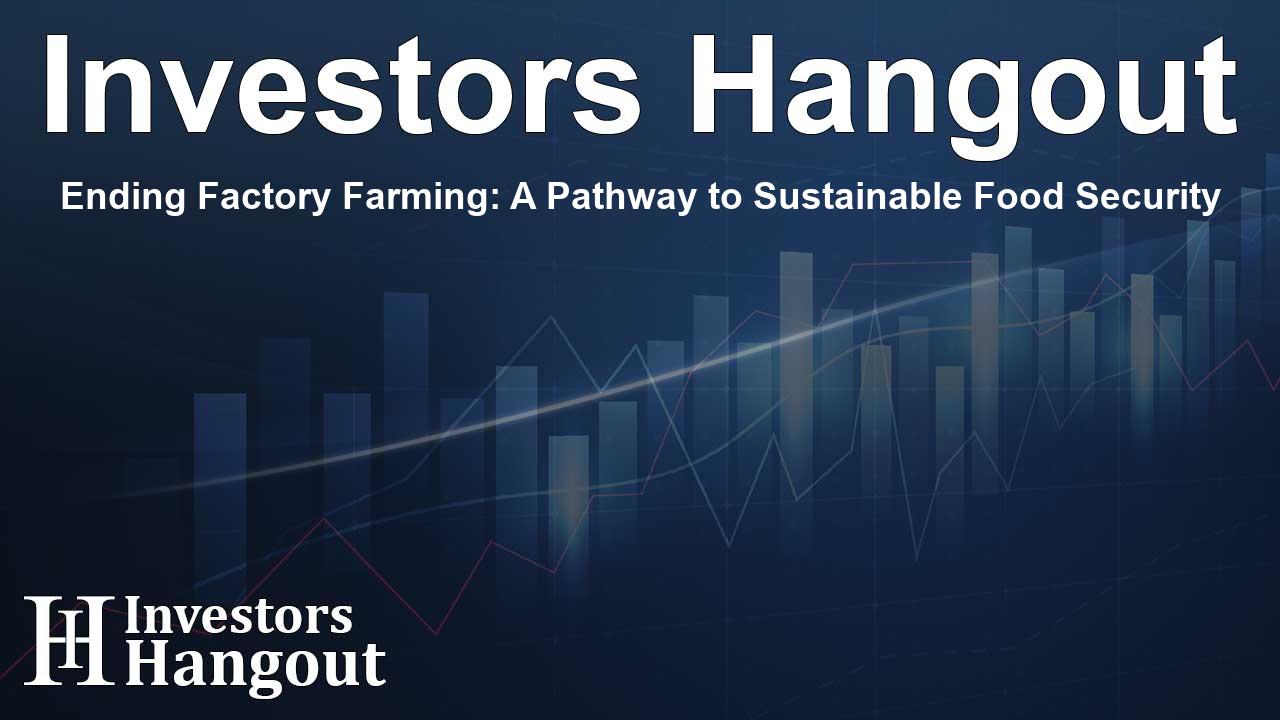Ending Factory Farming: A Pathway to Sustainable Food Security

Understanding the Impact of Factory Farming on Global Food Security
Factory farming is often overlooked in discussions about food security and waste, yet it plays a crucial role in understanding the global food crisis we face today. The recent report from Compassion in World Farming illuminates staggering statistics, showing the ripple effects of this widespread agricultural practice. By grasping the realities behind factory farming, we can work together towards innovative solutions that could feed billions and restore our environment.
The Alarming Statistics Behind Food Waste
Shocking figures reveal that factory farming contributes significantly to food waste globally. In fact, up to 766 million tonnes of grain are wasted annually to feed farmed animals, which amounts to a greater food loss than what's discarded by households, food services, or retailers combined. This acts as a stark contrast to the 631 million tonnes of food wasted in households alone.
Land Usage and Its Consequences
Ending the use of grain to feed factory-farmed animals could release vast amounts of arable land. For example, the European Union could potentially free up almost 15 million hectares while the United States could see over 7 million hectares become available. This land could then be redirected to grow food for human consumption, greatly improving food availability.
The Inefficient Cycle of Feeding Animals
The report also highlights a disturbing inefficiency in our current practices. For every 100 calories of human-edible grain fed to livestock, only a fraction—typically between 3 and 25 calories—result in meat or dairy products. This inefficiency exacerbates the food crisis and highlights the urgent need for reform in how we cultivate and distribute food.
Transitioning to Sustainable Practices
Switching from factory farming to more sustainable practices can change the food landscape significantly. Regenerative farming methods prioritize feeding animals with what is not suitable for human consumption, such as pasture or unused food scraps. This shift not only boosts food security but also helps preserve the environment by reducing the need for deforestation and minimizing chemical use.
The Role of Animal Welfare Organizations
Organizations such as Compassion in World Farming are at the forefront of this movement, advocating for policy changes that prioritize food for people over livestock feed. They encourage global support to adopt sustainable agricultural practices that would allow us to feed an estimated 2 billion more people every year.
Combatting Climate Change Through Better Policies
Addressing factory farming is not merely an issue of food distribution but also a matter of environmental impact. The unsustainable practices involved in factory farming contribute significantly to climate change, soil degradation, and biodiversity loss. Therefore, reforms are vital not just for human health but for the planet's future. One pressing need is for governments to cease subsidizing wasteful grain-based farming practices.
Creating a Global Movement for Change
It is imperative that individuals, communities, and nations come together to forge a future where food waste is minimized, and sustainability is prioritized. Initiatives, such as signing open letters to governments, can mobilize citizens and rally support for these vital changes.
Conclusion: A Pathway Forward
The fight against factory farming and the push for more efficient food production methods are critical. By prioritizing the direct feeding of crops to people rather than animals destined for meat production, we have the potential to transform how we feed the world's population. Not only can this approach save precious resources, but it can also make strides towards social equity by challenging the enormous waste embedded within current agricultural systems.
Frequently Asked Questions
What is factory farming, and why is it considered wasteful?
Factory farming involves raising large numbers of animals in confined spaces, focusing on efficiency but often at the cost of food waste. This method feeds billions of calories of grain to animals, resulting in minimal food returned to the human food supply.
How much food waste comes from factory farming?
Globally, factory farming wastes approximately 766 million tonnes of grain each year, which is more than food waste from households, food services, and retail combined.
What are alternative farming practices suggested in the report?
The report advocates for regenerative farming practices that focus on using non-human consumable resources for feeding animals. This includes pasture and food scraps, which can improve food security and environmental health.
How can individuals help in reducing food waste?
Individuals can raise awareness, support organizations advocating for policy changes, and choose sustainable food options that prioritize direct human consumption over animal feed.
What kind of policies should governments adopt?
Governments should prioritize policies that support sustainable agriculture, reduce reliance on grain-fed factory farming, and provide funding for initiatives that promote food production for human consumption.
About The Author
Contact Caleb Price privately here. Or send an email with ATTN: Caleb Price as the subject to contact@investorshangout.com.
About Investors Hangout
Investors Hangout is a leading online stock forum for financial discussion and learning, offering a wide range of free tools and resources. It draws in traders of all levels, who exchange market knowledge, investigate trading tactics, and keep an eye on industry developments in real time. Featuring financial articles, stock message boards, quotes, charts, company profiles, and live news updates. Through cooperative learning and a wealth of informational resources, it helps users from novices creating their first portfolios to experts honing their techniques. Join Investors Hangout today: https://investorshangout.com/
The content of this article is based on factual, publicly available information and does not represent legal, financial, or investment advice. Investors Hangout does not offer financial advice, and the author is not a licensed financial advisor. Consult a qualified advisor before making any financial or investment decisions based on this article. This article should not be considered advice to purchase, sell, or hold any securities or other investments. If any of the material provided here is inaccurate, please contact us for corrections.
